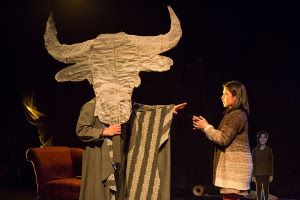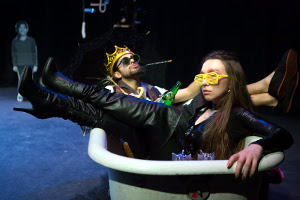
|
BEATE HEIN BENNETT
June 3 – 18, 2017 Every culture has ancient customs relating to the questions of life and death, the quality of living and dying, and some creative notions about the possibility of a Hereafter. The questions about the Hereafter are the most vexing: Is there a Hereafter? What might it look like? Is it Eternity? Is there a soul separate from the body? Is there a transmigration of the soul? If so, what will it traverse to get to Eternal Hereafter? Will the body rise from the dead? If so, what will it feel like? How do the living relate to the dead? Burial customs? Memories? Traditions of commemoration? And ultimately: If there is a Hereafter, who controls the Hereafter and the path to get there? God or gods? Guardian spirits? Devils or Angels?
Frances Ya-Chu Cowhig wrote a lively play that compounds different cultural strands as they collide in our contemporary cultural amalgam, more specifically as cultural traditions are experienced by the mixed progeny of Chinese- American youth in a period that increasingly demands cultural self-identification. The five characters in this play with the mysterious title “410[GONE]” are a young brother, age 17, and sister, age 21, of our own time and three figures from the Chinese Land of the Dead, The Goddess of Mercy (Guan Yi), The Monkey King (Sun Wu Kong) and Ox-Head (Niu Tou), the conveyor of souls. The time is specified as “Now;” the Place is “a closet in the Land of the Living” and “The Chinese Land of the Dead” a.k.a “Earth’s Deepest Retreat.” The play was originally directed by Evren Odcikin and produced by Crowded Fire Theater in San Francisco in 2013.
Yangtze Repertory Theatre’s present production at TNC is directed by Chongren Fan with production design by Joseph Wolfslau and lighting design by Yi-Chung Chen. The stage space in the Cino Theater is divided into an elevated small white cubicle stage right, a downstage space that includes a central floor design like a hopscotch disco dance pattern with the four sky directions, stage left a claw-footed bathtub, upstage a tower of hat stands with telephones of varied vintage; behind a black scrim across the entire upstage area a passage way indicates the transitional space into the Land of the Dead. The mixed elements on the stage thus arouse a curiosity of what’s to follow. And what follows is a curious mix of disco style dance that the dominatrix Goddess of Mercy breaks into, played very energetically by Meilin Gray, clownish slapstick routines by the subservient Monkey King, played dexterously by Gerardo Pelati, and the periodically appearing silent but ominous Ox-Head, played by Edgar Eguia. The sister, whom we only know as Twenty One, played by a diminutive but feisty Carolina Do, has her place in the white cubicle for most of the scenes, sitting cross-legged on the floor with a laptop through which she tries to communicate with her brother; a small altar by her side to which she periodically adds objects indicates some religious consciousness of Chinese tradition. Her brother, Seventeen—his name Patrick is a later discovery—played by a tall, lanky Roger Yen, transitions to the Land of the Dead. It is this collision between the realms of Life and Death, between the submerged traditional culture and the modern American existence as lived by young people of mixed cultural backgrounds, of a feeling of isolation and non-belonging that draws young people towards suicide that becomes the substance of the text. While the text mixes modern idioms and encourages buffoonery, there is also poetic potential in its Eurydicean pathos of loss and searching for a meaning behind a short-circuited life.
Director Chongren Fan moves the cast with speed through the twelve scenes, however, I wish that he had trusted the text more and varied the rhythm to allow the actors to find the poetry and articulate some of the crucial emotional points. He emphasizes the wackiness of the conceit—Chinese gods that are supposed to resemble traditional Chinese Opera figures but perform in the postmodern style of MTV pop. The deeper layer of the collage-like dramaturgy is lost to the audience by the hyper-energized physicalization of the text. The young enthusiastic cast is adept at executing the breakneck choreography but I would have liked to be able to empathize more with their inner lives, to find the “soul” of the play. |

| museums | NYTW mail | recordings | coupons | publications | classified |

